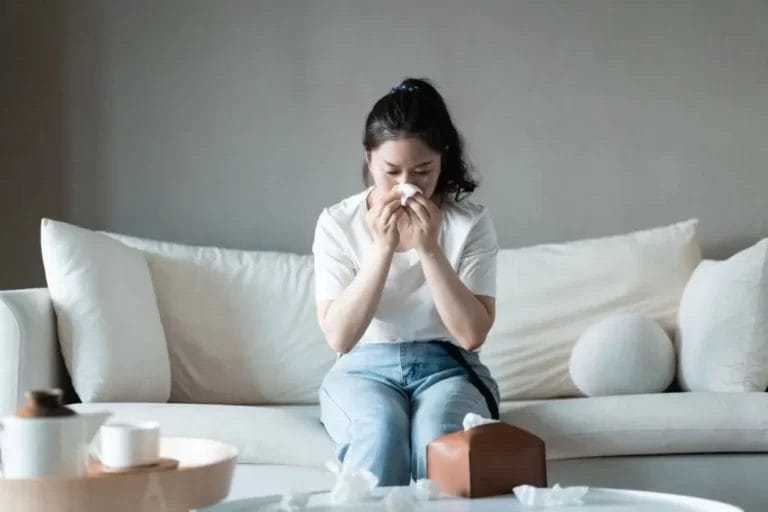Yes. Sadly, people on this earth will never get to experience the amazing taste of coffee because it is possible to be allergic to coffee.

But we are not here to make jokes about that. It’s a severe condition that can affect anyone. So today, let’s look at everything about caffeine allergy and how to recover from it.
What Can Cause A Caffeine Allergy?
Even when you don’t have an allergy, you can feel sick when taking more coffee than the recommended safe amount (400 mg). Going up to 500-600 mg can give you several side effects.
But those who aren’t used to coffee can feel the effects just after drinking a single cup of coffee. Also, coffee is more than just caffeine, so the allergic reaction can come from anything.
The following foods incite an allergic reaction in over 90 percent of people with food allergies:
- Eggs
- Fish
- Milk
- Peanuts
- Shellfish
- Soy
- Wheat
Since the most common element in coffee is milk, there’s a high chance that the creamer or milk present in your coffee is causing you to have allergic reactions.
It’s not just limited to milk too. For example, if you’re drinking coffee with syrups or other additives, your body will start showing allergic symptoms if one of those additives contains something you’re allergic to.
So the next time you’re having allergic reactions after drinking coffee, it’s best to start questioning the other components rather than just the coffee itself.
How Rare Are Coffee Allergies?
Though a study suggests that men are more sensitive to caffeine than women, caffeine allergy is very rare, confirmed by another older study.
Coffee farmers have sometimes shown allergic responses, but they were more of a reaction to the dust coming from green coffee beans than drinking coffee.
Other than that, there aren’t many confirmed reports or detailed studies that have information about how or why people can have caffeine intolerance.
Caffeine Allergy Symptoms
A true coffee allergy can cause severe symptoms in the body, usually within the first few hours after caffeine intake. Symptoms can affect many different parts of the body and usually worsen over time.
Among the common allergic symptoms are:
- Vomiting
- Nausea
- The color of the skin was reduced
- Diarrhea
- skin rashes, such as hives or blotches of red skin
- trouble swallowing
- shortness of breath or difficulty catching a breath
- a wheezing cough
- stomach or abdominal cramps
- reduced color in the skin
- weak pulse or a sudden drop in blood pressure
- dizziness or loss of consciousness
- Obstruction of airways from swelling
Coffee Sensitivity Vs. Coffee Allergy
Some are just highly sensitive to coffee and not exactly allergic. Though the reactions can be highly annoying, they are not fatal.
If you’re feeling one of the following symptoms, it means that you’re sensitive to caffeine and not having an allergic reaction.
Anxiety, uneasiness, or irritability after drinking coffee could indicate a coffee sensitivity.
Coffee sensitivity symptoms can include:
- Abdominal cramps
- Anxiety
- Jitteriness
- Heartburns
- Increased heart rate or blood pressure
- Insomnia or difficulty sleeping
- Irritability
- Nervousness
- Stomach ache
- Uncontrollable muscle spasms
- Uneasiness
These symptoms usually go away when you stop drinking coffee. But, if that’s the case, you have high sensitivity to caffeine, and it’s best to avoid it.
Elements In Coffee That Can Trigger Allergic Reactions
There are a variety of substances that can be present in roasted coffee and cause you to have an allergic reaction.
Element #1: Pesticides
Coffee farmers often use pesticides and other chemicals to keep the insects at bay. But unfortunately, when the beans are growing, sometimes the chemicals of the pesticides remain in the final product, which can trigger allergic reactions instead of providing extra health benefits.
Element #2: Sugar
Sugar can cause reactions in some people when taken in a high amount. Likewise, any coffee or other beverage that is heavily sweetened can cause these reactions.
Element #3: Flavored Syrup
Flavored syrups are manufactured and processed with various chemicals, which can easily cause allergic reactions in sensitive people.
Element #4: Dairy
Dairy is a well-known stimulant for allergic reactions in people with lactose intolerance. If a cup of coffee contains milk or whipped cream, the dairy elements in the milk products can cause allergies.
Element #5: Mycotoxins
In a recent study published in the Journal of Toxicology and Environmental Health, it’s been proven that coffee beans that have mycotoxins can cause allergic reactions if a person drinks coffee brewed from said beans.
Sadly, these elements can even survive the roasting and brewing method, so there’s no getting rid of them unless you throw away the beans themselves.
Having fun Nomies? Check out our piece on does coffee stunt growth.
When It’s Time To Visit A Doctor

If you’re noticing any symptoms or your existing symptoms are getting worse after coffee consumption, it’s time to visit a doctor right away.
The doctors can help you determine the root of the problem with tests while making sure if any pre-existing condition is making it any worse.
The Best Way To Treat A Caffeine Allergy?
If you’re facing allergic symptoms, there are quite a few steps you can take yourself to get rid of them. First, of course, seeking medical attention is a must, along with personal measures.
Step #1: Start By Avoiding Caffeine
Prevention is better than cure, and that applies, in this case, the most. If you don’t want to face caffeine allergies, start cutting off your regular coffee. But remember, other everyday food items also contain caffeine, such as:
- Chocolate
- Decaf
- Energy bars
- Energy drinks
- Meal replacement bars
- Sodas
- Soft Drinks
- Tea variations (Oolong, white tea)
Aside from these food elements, some painkillers also contain caffeine. Before taking any kind of medication, read the labels for contents, and consult a doctor for the right usage.
Step #2: Get More Physically Active
When you include a workout routine in your daily life, your body functions improve, which can improve your resistance to various side effects of caffeine, as well as the effects of caffeine withdrawal symptoms. At least 20 minutes of exercise every day can be an absolute life-saver.
Step #3: Get A Good Night’s Sleep
When you go to sleep at the same time every day, your body gets used to the routine. So it’s best to keep a constant sleep schedule that allows you to get enough sleep.
Step #4: Don’t Forget Your Vitamins
A few vitamin elements increase energy levels over time if you consume them regularly.
[Insert “don’t forget your vitamins” custom meme]
Step #5: Reduce On-Screen Time
Smartphones and other electronic devices emit radiation and blue light, which forces your nerves to stay awake for longer. This can become an issue when you’re trying to establish a proper sleep schedule.
To prevent this from happening, keep your devices away from you, and turn off any electric device, except the ones you definitely need (like your air conditioner)
Coffee Alternatives To Avoid Caffeine Allergy
There are a few alternatives for those who are caffeine intolerant but still need an energy boost or just enjoy the flavor of coffee without the side effects of caffeine.
Let’s take a look at a few options that you can opt to:
- Beverages are made from roasted chicory or grains. They have a rich flavor and provide a decent energy boost with no caffeine.
- Herbal teas (green tea, oolong tea, etc.)with different flavors. These teas give you a warm, refreshing feeling without any caffeine.
- Roasted corn, barley, or rice teas.
- White coffee, which is a splash of orange mixed in hot water.
- Ginger honey lemon tonic is a fine refreshment that you can serve both hot and cold. First, you need to mix water, chopped ginger root, lemon juice, honey, and you’re good to go.
Had fun reading? You’ll love to read our piece on should kids drink coffee.
Bottom Line
It’s understandable if you have a low caffeine tolerance, but there are a lot of alternatives that can make your morning tolerable. If you’re one of the individuals that get allergic after consuming coffee, we hope it wears off soon. Till then, enjoy the alternatives.
Cheers!
FAQs
If you have pre-existing allergy issues, and drinking coffee only worsens the symptoms, then there’s a high chance that you have a caffeine allergy.
It’s safe to consume up to 400 mg of caffeine every day, which makes it 2-3 cups in a day.
Your DNA structure and metabolism rate define your caffeine sensitivity.
If only drinking a single cup of coffee makes you feel the side effects of over-caffeination, you have a low caffeine tolerance.
No, most caffeine alternative drinks don’t have caffeine. But they still contain refreshing properties that can give you a decent energy boost.

